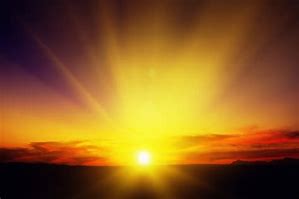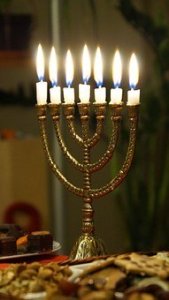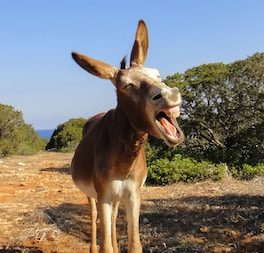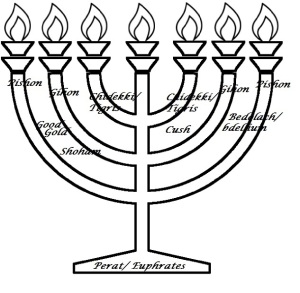Four Levites, Four Hours, and Redemption
Looking over the chapter listings in the Table of Contents in my upcoming book to be published, I thought to myself there needs to be another chapter. Needless to say, I didn’t realize Hashem would create hashgacha pratit (Divine Providence) in the near future until the spring of June 2019. What I am about to share is very true, raw, and incredible.
My beloved family (myself included) had no idea our path ahead was the entrance into a battlefield; facing death in a blink of an eye. The day after an amazing family dinner gathering in our home, Hashem sent forth a trail that would rock us to our core; trusting Hashem with everything a man has within. Our lesson would teach us gam zu’ l’tovah—this too is for the best.
We (my husband, son, daughter, and I) endured a very difficult tribulation that affected us physically; penetrating every emotion (thrown in all directions), thought process, measure of the heart, life, breath, love, fear, discouragement, pain, injuries, humbleness, gratefulness, compassion, endurance, and forgiveness. This placed us at the door of death and life.
Who is the key holder?
“I will place the keys of David’s palace on his shoulders; and what he unlocks none may shut, and what he locks none may open.” (Isaiah/ Yeshayah 22:22)[1]
“In token of abundant authority And of peace without limit Upon David’s throne and kingdom, That it may be firmly established In justice and in equity Now and evermore. The zeal of the LORD of Hosts Shall bring this to pass.” (Isaiah/ Yeshayah 9:6)[2]
The story begins:
My sister, brother-in-law, niece and nephew arrived from California for a mini vacation, with plans to fly home. They joined us for dinner, along with my lovely and amazing Mom. The table was beautifully set; the food was amazing, sharing delicious Jewish dishes. They had brought up our SUV. A friend of theirs had given it to us. They have a soft heart for children with special needs, and with their loving generosity, they gifted it to us. They said it was a “tank” and that we would love it. My brother-in-law, who is an awesome mechanic, did some repairs before the arrival.
After dinner, they left our beautiful truck [the best vehicle we’ve ever owned our entire lives!]; returning to my Mom’s home in her car. The following day, we got the truck registered, put on new license plates and set off on a wonderful scenic drive to a bird sanctuary for a peaceful family drive.
Returning home, my husband was driving, our kids were in bucket seats, and I had dozed off. I was awakened to my husband yelling, a sudden change in motion of the brakes, and an extremely hard hit by a truck slamming into my side. We were T-boned! A speeding (angry) driver failed to yield the stop sign. On impact, we were instantly airborne which rolled us over to the driver’s side. At the point of rolling, skidding on its side, hearing the crunching of metal, and seeing the severely broken and cracked windshield around the sides of the airbags, I began screaming, “G-d please help us, G-d please help us!”
My husband held on to the steering wheel with both hands; keeping his arm from amputation from the opened window while the truck was skidding on the driver’s side along the road, down an embankment, into a field! Our truck flipped back up, landing on its tires. By all rights of gravity, the truck should have rolled more; however, something “Mighty” stopped the truck. Our truck flipped back up on its tires where it rested. My daughter called out for “G-d” about the same time I did. She said she saw a bright light (covering/shield) around us when the truck suddenly came back up on its tires and rested– hashgacha pratit!
When the truck stopped, steam from the heating cord (radiator) was coming in at me. The mixture of steam, the smell of the “firecracker elements” (airbags deployed at 135 mph), and with the dust from the gravel sediments, I thought the engine was going to ignite. I went into hysterics; trying to open my side of the door to help my children! People came running into the field to help us [my husband told them to get me out of the truck]. Someone, obviously, called 911 as soon as we were hit (7:26 pm recorded time). The Firetruck, Ambulance, and Police arrived within minutes. Two people helped get our son out of the truck. One of those helpers was the man who hit us. Additional care was taken for our son as he has Cerebral Palsy, shunts for hydrocephalus, and he’s nonverbal with additional disabilities.
The passenger doors were smashed in so extensively that the inside door handles were completely broken, hanging by its wires. The doors on the passenger’s side were smashed in eighteen inches and partially ripped from its hinges. There was so much damage! Our Limited Sequoia was totaled, as well as the other driver’s truck. We are very grateful that the original owners had added more airbags (wrap-around curtain), customized bucket seats, and more; creating additional impact protection!
The Fire Department covered a very large area on the street with cat litter because of the excess oil and other fluids that spilled from both trucks. Someone found our daughter’s eyeglasses in the street, ruined. Our son’s eyeglasses were located in the field. The other driver’s hood on his truck looked like an accordion, crushed to the windshield. A policeman told me that the street looked like a “Garage Sale.”
I want to add an interesting moment that took place. A woman approached me, smiled and told me it was good news that my necklace was still intact. My necklace has the Star of David, and the Shema (Deuteronomy 6: 4-9).
It reads: “שְׁמַע יִשְׂרָאֵל יְהוָה אֱלֹהֵינוּ יְהוָה אֶחָֽד”
Hear O’ Israel, the Lord is our G-d, the Lord is One. (The Shema is a beautiful Jewish prayer that is recited twice daily. The Shema was also prayed on Mount Sinai upon when the Jews, and mixed multitude received the giving of the Torah and were sealed into Hashem’s covenant).
We were treated on the scene and released. But not before Hashem opened a door for me to share with the good citizens, policemen, firefighters, EMT’s, and the other driver that the mercy (rachamim) of G-d protected us all. There should have been fatalities, yet we all walked away from two totaled trucks. G-d’s Hand was upon us. While sharing how G-d protected us, I pointed at our truck and shared about the loving people who gifted us, even though it’s totaled, we were protected. I further said that life is precious and it can’t be replaced. Hashem found favor (Chen) in us—B”H!
I don’t recall anyone responding back, but I do remember one EMT gentleman continually watched and listened. I also shared with the other driver that I had forgiven him and I would be praying for his situation. He stopped in his footsteps, looked at me, and in a somber voice he thanked me. He is a young man of twenty-five years of age who didn’t heed the “stop sign.” I pray Hashem opened a doorway of divine healing for him; bursting forth a new outlook in life, being refreshed in Hashem’s Light!
My brother-in-law came to get us at the accident scene and safely got us home. Arriving home in the driveway, I broke down crying. I told my brother-in-law how scared I was; expressing my sadness for what happened to the truck that was gifted, the hard work, love given, and time it took to get it to us (one thousand miles apart). But the bottom line is: Life is precious, it can’t be replaced! The love of others and the hand of G-d saved our lives!
Hashem saved us with the gift of life (Chai); giving everyone a second chance to determine our direction in life and choices. Will we stay in the “Fastlane” seeking worldly desires that offers emptiness, deceitfulness, masquerades, and dead ends? Will we use the time Hashem has given us wisely that is pleasing to Hashem? Do we love Hashem enough to walk, speak, breathe life of Hashem’s goodness, and study Torah teachings, daven (prayers) with blessings daily? If not, why? Ha’satan’s (Satan’s) greatest weapon is man’s ignorance of G-d’s Davar/word.
We need to have complete Teshuvah (repentance, returning to Hashem) with a change of heart, a desire to be in Hashem’s covenant; living in obedience to Hashem’s word. We are given “Stop Signs” in life. We are to have wisdom and discernment to heed before entering our next path. Let’s be like a Jacob (one who studies Torah), not an Esau (running wild, untamed).
Let’s continue the story:
Thankfully, everyone was responsible to have worn seat belts. As the night progressed, the aches and pains set in. The next day, my sister and brother-in-law took the four of us to Urgent Care for evaluations and X-rays. We suffered from severe bruising, swelling, contusions, abrasions, seat belt trauma, and pain. Additionally, our son sustained a fractured knuckle and I had a severe concussion. By the second day after the rollover accident, I was experiencing loss of balance, impaired cognitive skills, extremely light sensitivity [covering my eyes inside my home while talking to others], and some confusion. We also were having nightmares from the accident.
My husband and sister took me to the Emergency Room. CT scans and more tests were run. It was confirmed that I was to be on complete concussion protocol. Our children and I followed up with additional medical care for months.
Hashem will continue to heal our Souls, mend our hurting hearts, and restore us physically and spiritually during our journey in the Wilderness.
“Why so downcast, my soul, why disquieted within me? Have hope in G-d; I will yet praise Him, my ever-present help, my G-d.” (Psalms/ Tehillim 42:12)[3]
Hashem answered our pleas for help with Hashem’s Chesed and an out-stretched Arm. Hashem’s blessings and chen came from those who ran down the embankment to help us, strangers who offered a soft blanket to sit on [to not have to sit in the weeds, gravel and dirt], and my dear family (sister, brother-in-law, niece & nephew) who stayed with us; offering love, help, prayers, and support! Hashem sends the people who will respond (Mitzvoth).
Baruch Hashem (Blessed is G-d) to have received assistance with our care, as well as concerned phone calls, texts, prayers, visits, rides to medical appointments, meals, groceries, medical supplies, light house cleaning, yard work, and more good deeds for three weeks! Love poured out with Hashem’s help. Baruch Hashem for He is Good and Faithful. His Chesed was sent to us in many ways! His kindness endures forever!
Let’s take this to a deeper level of understanding while looking at some connections. I don’t know the ultimate reason why this event happened, but names, times, dates, and numbers have a significant purpose and a function.
- Sequoia: Sequoia trees are also known as “Sequoiadendron giganteum.” They are the largest trees on Earth, and endangered. These fantastic trees of awe can live over two thousand years, and reach enormous heights topping three hundred and fifty feet high. Standing next to a giant magnificent Sequoia tree, we as human beings are very small in size. We are but a speck in comparison. How does this resemble the Jewish people? “‘A Sequoia’s roots “are so shallow that it can hardly stand up to a strong breeze” says Rabbi Dannel Schwartz. So how is it that this extraordinary species is able to grow so large and live so long? The answer is simple – the trees spring up in groves and their roots intertwine. Or as Rabbi Schwartz says “they hold each other up – they give each other the strength necessary to withstand the angriest winds.[…] As Frankl himself said “the more one forgets himself – by giving himself to a cause to serve or another person to love – the more human he is and the more he actualizes himself.’”[4]
Doesn’t this resemble the life story of the Jewish people? Our lifelong generations continue to overcome with unity. Have we not held up one another, like a tree, for over thousands years through the harshest of storms, and through winds of terror during the evilest of times? And here we are! There is strength in numbers. We need to stand together in unity, like roots, take hold of each other, not divided. When we come together, we can block out the “angriest winds.” Hashem’s Light is Life.
- Date: June 17, Jewish calendar of Sivan 14. Sivan was covered in “In Flight for Life” chapter. Fourteen is a multiple seven, which means a “Double measure.” The Hebrew letter of fourteen is Nun. Nun means “fish” and “Life.” Hashem gives us life. Fish are also connected to Day Five of Creation–taking the Torah out to the Nations, rapidly.
- David’s name has a gematria value of 14 (dalet, vav, dalet).
- Time: The time of the accident was given at 7:26. 7-26: The gematria of seven means completeness, stability, wholeness, ripeness. The Sabbath was sanctified by G-d on the seventh day of Creation. Day Seven of Creation is Holy (Shabbat/Shabbos/Sabbath). There are six days of labor, and the seventh is complete, to rest. The gematria of seven is Zayin, which means sword, to arm. Completion. “26”: G-d’s four-lettered sacred name that means: “The One Who is, Who was, and Who will be” which is Hashem’s Divine Name in the Torah. The true pronunciation of Hashem’s Name remains “hidden” in plain sight. We are to call out in the Name of Hashem, our G-d, for He is our Father in the Highest Heaven. Man had to wait twenty-six generations before receiving the Torah at Mount Sinai through Moses (Moshe). “The very act of serving G-d is the vehicle to reveal G-d.”[5] Our existence isn’t for self-glorification, but to glorify G-d. When we truly live our life in Torah, “And all the peoples of the earth shall see that the LORD’s name is proclaimed over you, and they shall stand in fear of you.”[6]
- The truck rested on four tires. Creation Day Four is to have authority to Govern, to have “Rulership.” The sun, moon, and stars were created on Day Four. The sun, moon, and stars are the natural light that separates the darkness. There are also Four Rivers of Eden. We are to wear tzit-tziyot (Tzit-tzits) on all four corners of our garments.
- There were four Levites on board. The Levites only had the Limited Sequoia in their names for four hours.
- The license plates given had the number of 713. “7” was already covered above. “13”: A powerful meaning in the Hebrew gematriot value that means “Love” and “Oneness.” It’s the connection that binds the eternal love of G-d and Israel in “Covenant” as Hashem’s “Set Apart” people (those who are Torah Observant and living Torah). The Jew and those who are in covenant with Hashem recognize that G-d is the Creator, and center of the Universe. When G-d revealed to Moses His 13 Attributes of Mercy, it was the most powerful expression of love, compassion G-d had given to His people: Love, Compassion, Covenant, and Eternity.
- The Rose has thirteen petals: Zohar 1:1a teaches that: It is written, as a rose among the thorns …the rose is the Assembly of Israel. Because there is a rose and there is a rose, just as a rose among thorns is tinged with red and white, the Assembly of Israel consists of judgment and mercy. Just as a rose has thirteen petals, the Assembly of Israel is surrounded on all sides by the thirteen attributes. Hashem will safeguard her. And like Israel, and the Thirteen Attributes of G-d’s Mercy, He safeguarded us too.
- Shir HaShirim (Song of Songs) G-d speaks His unremitting love of Israel: “I am for My Beloved, and My Beloved is for Me.” The acronym Elul (the sixth on the Jewish calendar which means “to search.”) means “Ani l’ dodi lil.”
It’s interesting to note that the Shechinah resided in their midst of the Mishkan. The Mishkan was a symbol that Hashem had forgiven the Israelites from the sin of the Golden Calf. Along the Camp of the Twelve Tribes of Israel, in the center (of their camps) was the G-d’s Presence (13th Spiritual center).
Highlights:
- G-d remembered four Levites in an exiled land. His eye (Ayin) was upon us. His Light “Covering and Shield” protected us. The increased light (our daughter saw a bright light) was a shield and a “double measure.” I do believe my cry out to G-d, like a shofar, rushed mightily through the Heavenly Gates, into our Father’s Divine Throne room and fell upon Hashem’s feet for rachamim.
- When I desperately cried out to G-d, “G-d please help us, G-d please help us!” I was recently reminded when Miriam was given leprosy for speaking Lashon Hara against Moshe, and his wife, Moshe cried out to Hashem to please heal her, please!” The Father, at the request of Moshe saying “please” twice granted Moshe’s plea. Perhaps my plea was granted by asking with “please” twice? A very profound thought, indeed! But then again, Hashem is Mighty and will answer our pleas. Hashem’s ways are higher.
The surrounded light brought Hashem’s “Set Apart” people to a “Rest.” The sword is mighty of G-d. The Tzitzits are attached to the four corners (remember His commandments) of our garments, and the Four Rivers of Eden pour out from the Throne of Heaven where G-d reigns.
- The Shechinah (His Presence) is the center of the Universe. Jerusalem is the center of the Earth. One day, we will return home in Jerusalem. Israel is the “Apple of His Eye.”
- “Love” and “Oneness” is the connection that binds the eternal love of G-d and Israel in “Covenant” as His “Set Apart” people. His Thirteen Attributes demonstrate Hashem’s rachamim and compassion. G-d answered our plea, and He stopped the truck from rolling more by reversing the direction of the truck, against gravity, to a “rest.”
- The G-d of Abraham, Isaac, and Jacob (Israel) is my Beloved, and I am His Beloved.
Bringing it together
Earlier, I mentioned in this story that the other driver was mad while speeding. Yes, he was very angry about a life situation he was dealing with. The driver made known that his actions were not an excuse for failing to stop at the stop sign. He admitted to his wrongdoing. I cannot fathom the thought of losing any of my family, or my children being left without their mom or dad, or any of us witnessing the death of the other driver. As you have read prior regarding my son born extremely early, and the hardships he endured, I am extremely grateful his life didn’t end in the rollover accident.
The severity of the impact from both vehicles should have left fatalities! It’s tragic to think how many angry drivers are on the roads and can end up killing lives needlessly. Sadly, death impacts others deeply who have to go on in this life without them. I am so thankful that every one of us was able to walk away. B”H!
It’s important to remember when we leave our Nefesh (flesh/Soul) unchecked by not allowing our spirit within to lead, we can become overheated, like Esau (red and hairy); running wild in the field. When there’s no accountability for our behavior, our “Esaus” lead, and we conform to a beast rather than a “Jacob.” Jacob was a man who studied the Torah in a tent (covering). Do we want to be under Hashem’s covering, shielded and protected?
Hashem loves and desires to protect us. Before the accident, a dear friend of mine, Landra, who has the gift of visions when praying for others shared something she saw while praying for me. I contacted her two days before the accident; asking if there were any changes. She said there had. In the vision, I was standing, worn out and tired with long brown hair and bangs. My body was weak with my hands at my side. I didn’t move, but stared at her (Landra). Beneath me, a daisy flower grew and encircled me. As I stood wearing a long white tunic (down to my feet), the daisy encircled me. I was entwined. The leaves and branches held me when I sat upon the leaves and its supporting stem. I was securely (protected). In front of me, there was a thin ravine, a parting of the ground. It was hardly noticeable. It didn’t concern me. The important part of this vision is that in my weakness I was supported, shielded and protected. She was able to see that I was fully at peace and I wasn’t surprised by any of it.
Was this vision a warning? Was the ravine a separation in the ground during the rollover, skidding from the road, down the embankment into a field (ravine)? Was the stem that entwined a way to alert me that I am held, yet in my weakness, I am supported and protected?
Seven days after the accident the vision changed, slightly. I was no longer held by the daisy. There was no longer a ravine (ground separation); but instead, I was lying down on my right side on top of brown soil. My hands are under my head, sleeping peacefully. The daisy bowed over to protect and shield me by its flower petals (twenty petals, Hebrew meaning of redemption, kaph opened palm; freely giving) and leaves (five leaves, Hebrew meaning of Salvation: I will raise the cup of salvation, Spirit of Power/Gvurah). The covering is pure; protecting me from harshness or storms. I am truly at peace as it’s a resting time that G-d Himself is assuring. Recently, the vision changed somewhat. Hashem has placed me on a new quest– adventurous journey! After jumping over a division of land, I am standing at an alter, holding a stone (river rock) in the palm of my hand. We are called to G-d’s Divine Rulership, to keep and guard the Torah. Hashem is our Rock of Salvation, fortress, and deliver (Psalms/ Tehillim 18:2). Hashem is our high place of refuge (misgav).
I am learning the importance of giving myself time to heal from my concussion. Through a recent session for PTSD, I learned that I can go through the accident step by step to look for the positives by removing the scary negatives (images) that steal my joy. I can talk about the accident; knowing that everyone is safe. Death itself cannot separate me from the love of G-d.
In my PTSD session, it was very helpful to have a different perspective on how to heal; giving myself patience and reminding myself I can get through this. Stepping back in time, I can imagine a second “June Pamela.” What would I say to her (stepping back in time) after the accident? Imagine that she hasn’t walked in my recent footsteps yet. She’s shocked and doesn’t know what to expect next. How can I be a good “sister” to her? What can I offer? How will I encourage her? Will she feel loved, safe, and helped with compassion and understanding? Will anyone cover her in prayer? Will anyone daven for her? Will she feel protected and shielded? Can I bless her with what I know now? In other words, will I be patient with myself and see the amazing Attributes of Hashem, His strength, and power to heal me? Yes! Positive words heal.
Rebbe Lubavitcher elegantly addressed his response to a tragedy regarding healing. He states, “I was placed in this unfathomably challenging situation for a purpose and I’ve been given the strength to overcome it.” G-d gives us the strength needed so that we can be overcomers with Hashem’s help. We are given a journey that takes us into the Wilderness. It’s a time of hardship, uneven ground, stumbling rocks, dryness, uncertainties, challenges, sadness, and tragedies.
During this time, we are stripped of our self-seeking ways. We learn to rely on G-d for our provisions. This is our journey; a path that allows us the choice to follow Hashem’s Way, to trust, and believe that G-d is our Protector and Shield.
Time has been given so that we can come to Hashem; seeking Teshuva (repentance by returning to our Father) which is finding Life in Hashem. Will we choose Life? Rabbi Gartner teaches us to look toward the Torah to find perspective on our inner self by asking what we can learn from the Ancient Torah of Wisdom (Chokmah). He reminds us that the ultimate good is experiencing G-dliness. We will find Hashem’s righteousness when we can truthfully ask ourselves if our heart, in its current condition, can house G-d.
Rabbi Gartner asks, “What are the influences of your Father’s House?” Our purpose is to go through our journey; trusting Hashem has given us the needed provisions, to overcome our trials and tribulations, to serve others (mitzvoth/deeds), to do good, seek forgiveness, and return to Hashem with Teshuvah. We will never taste the goodness of G-dliness if we will not allow ourselves to align with the Divinity of Hashem; having a change of heart.
We receive healing when we respect others, have a sense of belonging to family and friendships, feel safe, and have food, clothing, shelter and rest. Our life is found IN the Torah. G-d is the Giver and the doorway to Life. He separates darkness with Light (Torah) and Truth (Emet). He gives us rest, a shield, protection and a covering. He forgives our sins upon repentance; giving us opportunities to choose life in Him. He is the center and the Shechinah (Divine Presence) of the Universe. Hashem IS Compassion, Justice, Mercy, and Loving-kindness (chesed). Let’s remember that everything that comes our way, we can be certain it’s Gam zu’ l’tovah—this too is for the best.
“Hashem opened two doors–one in Shamayim (upper heavens), and one in the heart of man. When one opens his heart for the needs of his fellow man, then the corresponding door of Shamayim is opened to hear his cry.”[7]
G-d is my strength and my shield. He is my refuge. My hope is found in Him.
- G-d is strength
- G-d is a shield
- G-d is refuge
- G-d is hope
Shalom!
[1] Isaiah/ Yeshayah 22:22, Sefaria
[2] Isaiah/ Yeshayah 9:6, Sefaria
[3] Psalms/ Tehilliam 42:12, Sefaria
[4] https://www.jcfhartford.org/NewsEvents/ViewArticle/tabid/171/smid/619/ArticleID/62/reftab/170/Default.aspx
[5] Jewish Wisdom in Numbers, pg. 228, Osher Chaim Levene with Rabbi Yehoshua Hartman
[6] Deuteronomy/ Devarim 28:10, Sefaria
[7] On the Shoulders of Giants, by Rabbi Shmuel Bloom, pg.115


























Recent Comments